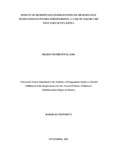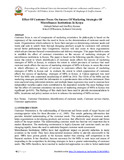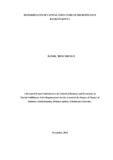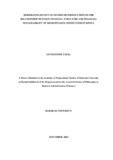EFFECTS OF MICROFINANCE INTERVENTIONS BY MICROFINANCE INSTITUTIONS ON WOMEN EMPOWERMENT: A CASE OF NAKURU CBD WEST SUB-COUNTY, KENYA
Abstract
Microfinance has built up a lot of attention as a way to eradicate poverty and
empowering women. According to the Nakuru County Integrated Development Plan
Report (CIDPP 2018-2022), low outreach of microfinance interventions by MFIs to
encourage women empowerment in Nakuru CBD is evidenced by the fact that the MFIs
are less than ten years in operation. This study sought to establish the effects of
microfinance interventions by microfinance institutions on women empowerment in
Nakuru CBD West Sub-County, Kenya. It focused on four specific objectives: to
determine the effect of micro credit on women empowerment, to examine the effect of
micro savings on women empowerment, to assess the effect of micro insurance on
women empowerment and to establish the effect of training on women empowerment.
The study was guided by viscous cycle of poverty theory, mental accounting theory,
prospect theory, human capital theory and women empowerment theory. A descriptive
survey and cause effect research design was employed. The study targeted a member
from each of the women having income generating ventures groups in the Nakuru West
Sub-County engaging in microfinance. The sample of 127 respondents from a target
population of 293 women groups was collected using the simple random technique. This
research followed the use of the questionnaire as a key data collection method, which
had been built on a five- point Likert scale. The data was analysed with the aid of
Statistical Package for Social Sciences (SPSS) including instruments like frequencies,
percentages, cross tabulations, Chi square of test of good fit and independence had been
employed. Inferential statistical analysis were conducted using the Pearson Correlation
Coefficient, ANOVA and multiple regression analysis to establish the relationship
between the dependent and independent variables. Analyzed data was presented inform
of statistical tables, charts and graphs. Results show that except for micro insurance
(t=1.247, p=0.217), other MFI interventions such as microcredit (t=5.105, p=.000), micro
savings (t=7.614, p=.000) and training (t=3.263, p=.002) significantly and positively
affect empowerment of women. This study concludes that for efficient realization of
positive effects, the microcredit has to be readily accessed and the interest rates be very
flexible to attract many, the process of savings withdrawals from savings accounts in
MFIs should be timely, micro insurance services should be able to reach women and
non-financial services complements the rest to realize the positive effects on user since
these non-financial services sharpens personal skills. Some of the recommendations
made include; The regulators of micro finance institutions should have a policy that will
regulate the rate of interest charged as women entrepreneurs felt that the interest rates
were too high and hence some were reluctant to take loans, Micro finance institutions
should reduce the cost of training sessions or provide it as a complementary free service
for the first year to all their clients in order to allow a larger number of women
entrepreneurs to access training and hence get empowered and the design of micro
savings should be changed so that it can be aligned to the client’s needs such that
withdrawal procedures should be made more easy and the time period for consequent
withdrawals be reduced.
Collections
Related items
Showing items related by title, author, creator and subject.
-
Effect Of Customer Focus On Success Of Marketing Strategies Of Microfinance Institutions In Kenya
Nduati, Gidraph; Kamau, Geoffrey (KABARAK UNIVERSITY, 2019-09)Customer focus is one of components of marketing orientation. Its philosophy is based on the supremacy of the customer thus the need to focus on the determination of customer needs and wants. Organizations which endeavor ... -
DETERMINANTS OF CAPITAL STRUCTURE OF MICROFINANCE BANKS IN KENYA
NDUNG’U, DANIEL THUO (KABARAK UNIVERSITY, 2016-11)Most capital structure studies to date are based on data from developed countries’ firms and very few studies provide evidence from developing countries. Capital structure of Microfinance banks in Kenya has not been ... -
MODERATING EFFECT OF INCOME DIVERSIFICATION ON THE RELATIONSHIP BETWEEN FINANCIAL STRUCTURE AND FINANCIAL SUSTAINABILITY OF MICROFINANCE INSTITUTIONS IN KENYA
TALEL, LIVINGSTONE (2024-11)Microfinance Institutions (MFIs) play a critical role as a driver of socio-economic development promoting the achievement of Sustainable Development Goals (SDGs). MFIs in developing countries boost entrepreneurial activities ...




